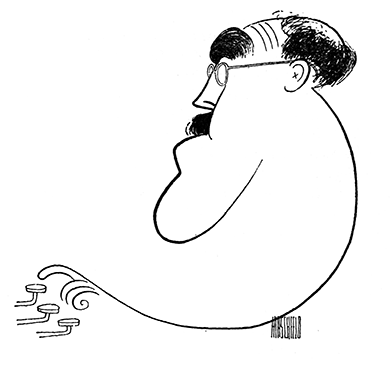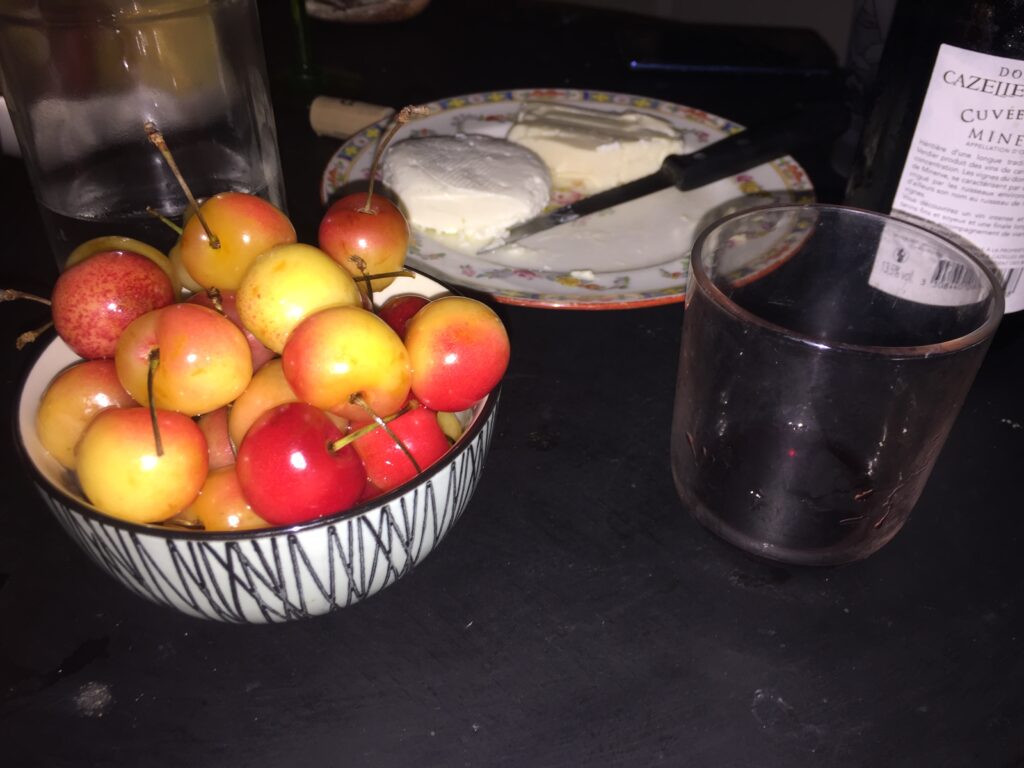Issue 30, Summer-Fall 1963
 Sketch by Al Hirschfeld, 1963.
Sketch by Al Hirschfeld, 1963.
S. J. Perelman has an eighty-acre farm in Bucks County, Pennsylvania (where the house is “shingled with second-hand wattles”), a Greenwich Village apartment, and a no-nonsense, one-room office, also in the Village. It was there that the interview took place. The office is furnished like a slightly luxuriant monk’s cell: a few simple chairs, a desk, a cot. On the walls are a Stuart Davis watercolor and photographs of James Joyce, Somerset Maugham, and the late Gus Lobrano, a New Yorker editor and close friend of the author. The only bizarre touch is David Niven’s hat from Around the World in Eighty Days, mounted on a pedestal.
Mr. Perelman, trim and well-tailored, is of medium build. His hair is gently receding, and graying at the temples. He wears old-fashioned steel-rimmed spectacles, bought in Paris many years ago. He is soft-spoken and reserved, sometimes chilling, and gives the impression that he does not suffer “nudnicks” gladly. He cares about words in their proper places; in his speech each sentence emerges whole and well-balanced, and each generally contains one or two typically Perelmanesque words. He is impatient with obvious questions—those that he has been asked over and over again in hundreds of interviews—but lights up when talking about his days in Hollywood, or telling anecdotes about his friend Robert Benchley. As The Listener put it, reporting on a television interview, “Mr. Perelman knew all the answers and gave such as he chose.”
INTERVIEWER
We’ve always been intrigued that when your first book, Dawn Ginsbergh’s Revenge, appeared in ’29, there was no author’s name on the title page. Why?
S. J. PERELMAN
Well, it was really an oversight of my own. I was so exalted at being collected for the first time that, in correcting the galleys, I completely overlooked the fact that there was no author’s name on the title page. Unless one happened to look at the spine of the book, there would be every implication that it was written by its publisher, Horace Liveright.
INTERVIEWER
Do you look back on your work with pleasure? How long is it since you’ve reexamined Dawn Ginsbergh’s Revenge?
PERELMAN
I haven’t actually looked on it for some time. As far as deriving any pleasure, it would be quite the reverse.
INTERVIEWER
Is that true of all your pieces?
PERELMAN
Well, there are a couple of them I consider verbal zircons if not gems. In Raymond Chandler Speaking, a recently published collection of his letters, I ran across a very flattering reference he made to a parody of his work I had done, “Farewell, My Lovely Appetizer.” So I reread a few pages of that to see whether the praise was merited. I prefer not to say whether I think so or not. Otherwise, let me assure you I don’t sit in the chimney corner cackling over what I’ve written.
INTERVIEWER
Is that because of the effort you put into each piece?
PERELMAN
Possibly. I very much doubt whether I work harder than any other writer, but this particular kind of sludge is droned over while working so that it becomes incantatory and quite sickening for me, at least, to reread.
INTERVIEWER
So much of it is pure art and skill, I should think one would say, “My God, how did I make that association, that connection?”
PERELMAN
I don’t know whether I approve of the picture you suggest of me, lounging about admiring myself in a hand mirror.
INTERVIEWER
Well, in those rare instances when you reread something after a few years, do you get the feeling you should have done something else to a sentence, to a phrase?
PERELMAN
No, I generally feel astonished at whatever I put down in the first place. The effort of writing seems more arduous all the time. Unlike technicians who are supposed to become more proficient with practice, I find I’ve grown considerably less articulate.
INTERVIEWER
Is that because you are increasingly more selective?
PERELMAN
Could be. Also the variety of subjects is restricted the longer I stay at this dodge.
INTERVIEWER
Why?
PERELMAN
Well, principally through sheer ennui on my part. I’ve sought material, for example, in the novels I read in my youth, the movies I saw, my Hollywood years, and in advertising. Ultimately, I began to regard these matters as boring. I always grieve for the poor souls who have to grind out a daily humorous column or a weekly piece—people like H. I. Phillips who are obligated to be comical on whatever topic. I remember Benchley did a column three times a week at one time and ran into deep trouble. It’s just not possible, in my view.
INTERVIEWER
There were more of those columns back in the ‘20s and ‘30s when Don Marquis was working that way, and F.P.A.
PERELMAN
Well, Marquis fortunately had Archy, his cockroach, and the Old Soak. When you create character it’s much easier because you can keep that spinning. In Frank Adams’s case, let’s not overlook the extensive help he got from contributors—Ira Gershwin, Sam Hoffenstein, Arthur Kober, Yip Harburg—a pretty respectable roster of names.



